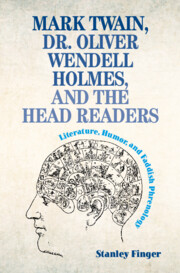 Mark Twain, Dr. Oliver Wendell Holmes, and the Head Readers
Mark Twain, Dr. Oliver Wendell Holmes, and the Head Readers Book contents
- Mark Twain, Dr. Oliver Wendell Holmes, and the Head Readers
- Mark Twain, Dr. Oliver Wendell Holmes, and the Head Readers
- Copyright page
- Epigraph
- Contents
- Tables and Figures
- Preface
- 1 The Birth of a Controversial Doctrine
- 2 Coming to America
- 3 Skeptical in Hannibal
- 4 The River, the West, and Phrenology Abroad
- 5 Mark Twain’s “Small Test”
- 6 Tom, Huck, and the Head Readers
- 7 More Head Readings and a Phrenological Farewell
- 8 Young Holmes and Phrenology in Boston
- 9 An American in Paris
- 10 Quackery and Holmes’s Head Reading
- 11 Holmes’s Professor on “Bumpology”
- 12 Holmes’s “Medicated Novels”
- 13 Mr. Clemens and Dr. Holmes
- 14 Phrenology Assessed
- Epilogue
- References
- Index
14 - Phrenology Assessed
Published online by Cambridge University Press: 17 April 2023
- Mark Twain, Dr. Oliver Wendell Holmes, and the Head Readers
- Mark Twain, Dr. Oliver Wendell Holmes, and the Head Readers
- Copyright page
- Epigraph
- Contents
- Tables and Figures
- Preface
- 1 The Birth of a Controversial Doctrine
- 2 Coming to America
- 3 Skeptical in Hannibal
- 4 The River, the West, and Phrenology Abroad
- 5 Mark Twain’s “Small Test”
- 6 Tom, Huck, and the Head Readers
- 7 More Head Readings and a Phrenological Farewell
- 8 Young Holmes and Phrenology in Boston
- 9 An American in Paris
- 10 Quackery and Holmes’s Head Reading
- 11 Holmes’s Professor on “Bumpology”
- 12 Holmes’s “Medicated Novels”
- 13 Mr. Clemens and Dr. Holmes
- 14 Phrenology Assessed
- Epilogue
- References
- Index
Summary
Neither Holmes nor Clemens was rejecting everything about phrenology. They were most concerned about phrenology’s craniological tenets – the unsubstantiated idea that small bumps and depressions on the skull can reliably reflect the growth and development of underlying parcels of brain tissue and reveal the organs of mind. They did, however, seem to accept the concept of many independent organs of mind, though not necessarily the ones listed by Gall or others. They also bought into the idea that the front of the brain is more intellectual than its posterior. Additionally, they agreed that character traits are inborn, stable, and run in families and that juries should consider the state of a criminal’s brain. Moreover, neither man had any use for metaphysics. Interestingly, Holmes saw phrenology as a branch of anthropology (broadly defined). As he put it: “Strike out the false pretensions of phrenology, call it anthropology; let it study man the individual in distinction from man the abstraction … and it becomes the proper study of mankind, one of the noblest and most interesting of pursuits.” Twain was also fascinated by the diversity he observed among his fellow human beings, and also felt the family of man deserved further study.
Keywords
- Type
- Chapter
- Information
- Mark Twain, Dr. Oliver Wendell Holmes, and the Head ReadersLiterature, Humor, and Faddish Phrenology, pp. 281 - 305Publisher: Cambridge University PressPrint publication year: 2023
